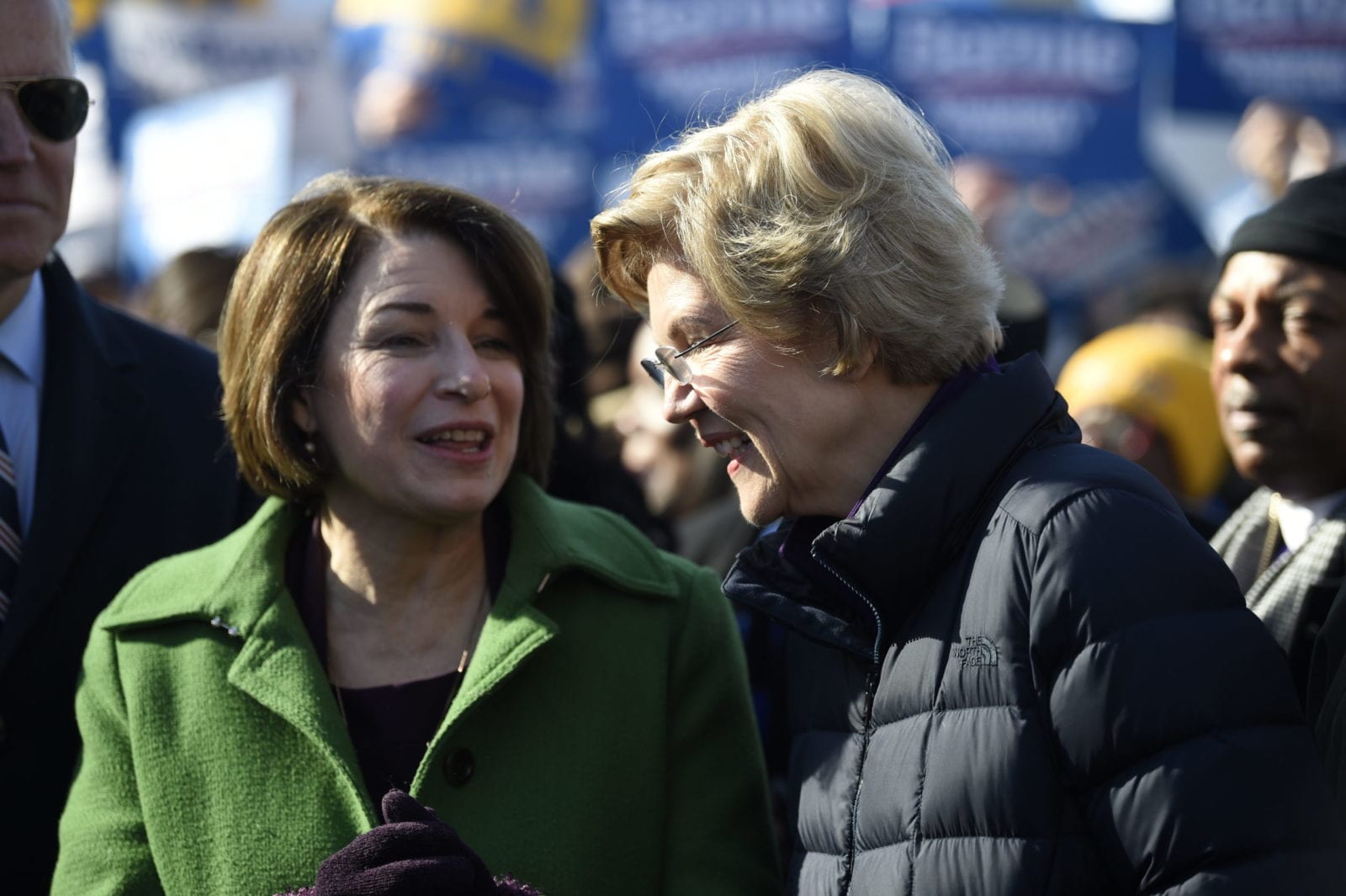This story was co-published with The Washington Post.
“Nevertheless, she persisted.”
Sen. Mitch McConnell (R-Ky.) inadvertently made these three words a battle cry in 2017 when he used them to describe his decision to silence Sen. Elizabeth Warren (D-Mass.) for criticizing the nomination of Sen. Jeff Sessions (R-Ala.) to become attorney general.
Now, almost exactly three years later, the phrase seems to be a campaign strategy for Warren and Sen. Amy Klobuchar (Minn.), the two top-tier women in the 2020 Democratic presidential primary.
On Tuesday night, at the first-in-the-nation primary in New Hampshire, Klobuchar surged ahead, finishing third with 19.3 percent of the vote, with more than 91 percent of precincts reporting Wednesday morning.
Bounding onto the stage in Concord, N.H., on Tuesday night, joined by her husband, John, and daughter, Abigail, Klobuchar beamed as she addressed the crowd: “Tonight is about grit. And my story, like so many of yours, is one of resilience.”
Klobuchar stunned the political class with what looked like an overnight success, but it was all part of what she said has been her nomination strategy all along: slow and steady, not shock and awe.
Warren, whose mantra is “Outwork, Out-Organize, Outlast,” is taking a similar approach. While she finished third in the Iowa caucuses and fourth in New Hampshire, hours before the polls closed Tuesday, she rolled out her endurance strategy in a memo to supporters.
“The road to the Democratic nomination is not paved with statewide winner-take-all victories,” wrote her campaign manager, Roger Lau. The campaign’s focus “is on building a broad coalition to win delegates everywhere.” He further underlined the campaign’s marathon approach by pointing to Warren’s on-the-ground staff of 1,000 people in 31 states.
Klobuchar and Warren have both said they are running campaigns of durability, an approach that may favor female candidates who tend to be judged on performance rather than potential, said Democratic strategist Jen Palmieri.
“Women are not momentum candidates,” Palmieri said. “They have to prove themselves and win voters over, over the course of time. Men can get swept up in a tide of momentum that can carry them to the nomination. It’s different for women. They’re on a slow burn.”
Such a plan explains why Klobuchar — who came in fifth in Iowa but who, her campaign said, exceeded expectations with limited resources in the state — visited all 99 counties ahead of the caucuses and made nearly two dozen trips to New Hampshire, or why Warren spends hours taking selfies and connecting with voters on a personal level.
It may also signal a shift in voters’ perceptions of electability, which has heavily favored male candidates like former vice president Joe Biden — who abandoned the state for South Carolina hours before finishing fifth on Tuesday — Sen. Bernie Sanders (I-Vt.), who won Tuesday’s primary, and former South Bend, Ind., mayor Pete Buttigieg, who came in a close second.
In addition to a message attempting to persuade voters she is best positioned to beat President Trump and unify Democrats in November, Klobuchar’s pitch to voters in an ad that aired in New Hampshire on Tuesday echoed a key theme of her stump speech in recent days: tying her candidacy to a story about a mourning American who wept as President Franklin D. Roosevelt’s funeral train rolled across the country, telling a reporter who asked if the man knew Roosevelt, “No, sir, I didn’t know him, but he knew me.”
The senator has looked out into crowds, making eye contact and telling them, “I know you, and I will fight for you,” inspiring the hashtag #AmyKnowsMe.
The dynamic until recently was reminiscent of Hillary Clinton’s 2016 presidential primary campaign, said Democratic strategist Adrienne Elrod.
“No matter how hard she tried, she had to prove herself time and time again,” said Elrod, who worked as Clinton’s spokeswoman in 2016. “Certainly, Hillary Clinton helped break the mold as the first female nominee of a major party, but the public is still grappling with what do we expect out of a woman who’s running for president.”
Even as Warren and Klobuchar racked up key endorsements — they split the New York Times’s editorial board endorsement — momentum benefited Buttigieg and Sanders after they took the top two slots in Iowa. Both male candidates dominated talking time in Friday night’s debate in New Hampshire and were in high demand on the Sunday political shows ahead of Tuesday’s vote.
For Klobuchar, durability could now be translating into the momentum female candidates often have to work harder to earn.
She was praised for a breakout performance during the last debate on Friday, which boosted her fundraising and standing in the polls. By Monday, Klobuchar’s strategy appeared to be paying off, as she made her closing argument to voters at the Nashua Rotary Club. The previously scheduled visit had long been on the calendar, but what was not planned was the throng of media attention after the morning’s news that she had risen to third place in the polls.
Tina Andrade was among those in the audience. Though she was impressed with the senator after first seeing her in Nashua nine months ago, Andrade said Klobuchar earned her vote Friday night on the debate stage.
“We had been Biden supporters, and he’s a great guy, but … there aren’t any other candidates that I like,” Andrade said. “She has the depth of experience, I think she has empathy, she’s just smart and has a lot of integrity. So that’s perfect.”
Warren congratulated Klobuchar Tuesday night, saying, she showed “just how wrong the pundits can be when they count a woman out.”
Klobuchar asked supporters and those new to her campaign’s success to join and donate to propel her into Nevada and South Carolina later this month. On Tuesday night, Justin Buoen, her campaign manager, tweeted she had raised an additional $2.5 million since polls closed.
A Washington Post average of national polls has Warren with 15 percent of the vote and Klobuchar with 4 percent. Polls also show Klobuchar struggling with the Black and Brown voters who make up the base of the Democratic Party and who will significantly factor into the primary for the first time in the coming weeks.
Still, her campaign is vowing to compete, with Klobuchar making a seven-figure ad buy in Nevada.
“What we’ve been is steady, we’ve been strong and we’ve never quit,” Klobuchar told the crowd Tuesday night. “I think that sounds pretty good for a president.”







